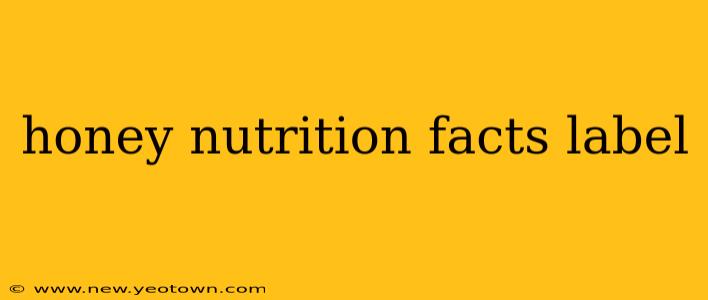Honey, that golden nectar of the bees, has been a staple in human diets for millennia. But beyond its delicious sweetness, what exactly is in this natural wonder? Let's delve into the world of honey nutrition facts, unraveling the mysteries behind that tiny label.
Our story begins in a sun-drenched meadow, where busy bees collect nectar from vibrant flowers. This nectar, a complex mixture of sugars, undergoes a remarkable transformation within the beehive. Enzymes break down the nectar's sugars, and the bees carefully dehydrate it, resulting in the viscous, golden liquid we know as honey. This natural process results in a nutritional profile that is both simple and surprisingly diverse.
What are the main components of honey's nutritional value?
The honey nutrition label typically highlights the predominant components: carbohydrates, primarily in the form of sugars (fructose and glucose). These provide quick energy, fueling our bodies efficiently. But honey also contains small amounts of other nutrients, adding another layer of complexity to its nutritional profile. While the exact composition varies depending on the floral source and the honey's processing, most honeys share a similar overall nutritional makeup.
What are the different types of honey?
Different types of honey, from clover to wildflower to buckwheat, exhibit slight variations in their mineral and antioxidant content. These variations arise from the diverse nectar sources and environmental factors influencing the bees' foraging activities. For example, buckwheat honey is often darker and possesses a more robust flavor profile, and it tends to have higher antioxidant levels compared to lighter honeys like clover honey.
Does honey contain vitamins and minerals?
Yes, honey contains trace amounts of vitamins and minerals. However, it's crucial to understand that these amounts are relatively small, and honey shouldn't be considered a primary source for these nutrients. Think of them as bonus components rather than the main nutritional players.
Is honey a good source of antioxidants?
Honey's antioxidant properties have garnered significant attention. Antioxidants are beneficial compounds that help protect our cells from damage caused by free radicals. The darker honeys, in particular, tend to be richer in antioxidants. The levels of antioxidants, however, are dependent on many factors, including the botanical origin and processing methods.
How many calories are in a tablespoon of honey?
A single tablespoon of honey typically contains around 64 calories. This calorie count primarily stems from the carbohydrates present in the honey. It's important to remember that while honey offers a natural sweetness, consuming it in moderation is key to managing your overall calorie intake.
Is honey good for weight loss?
The question of whether honey aids weight loss is complex. While it offers a natural sweetness, replacing refined sugars with honey doesn't automatically lead to weight loss. The caloric density of honey is relatively high, so mindful consumption is paramount.
What are the potential health benefits of honey?
Throughout history, honey has been used for its potential health benefits, ranging from soothing sore throats to promoting wound healing. However, it is crucial to note that these potential benefits require more extensive scientific research to confirm their efficacy and to determine proper usage.
In conclusion, the honey nutrition label gives us a glimpse into this natural product's nutritional composition. While carbohydrates are the primary component, the presence of trace minerals, vitamins, and antioxidants adds to its overall nutritional value. However, it's vital to remember that honey should be enjoyed in moderation as part of a balanced diet. Its sweetness and versatility make it a delightful addition to our culinary creations, but understanding its nutritional profile empowers us to make informed choices about its consumption.

